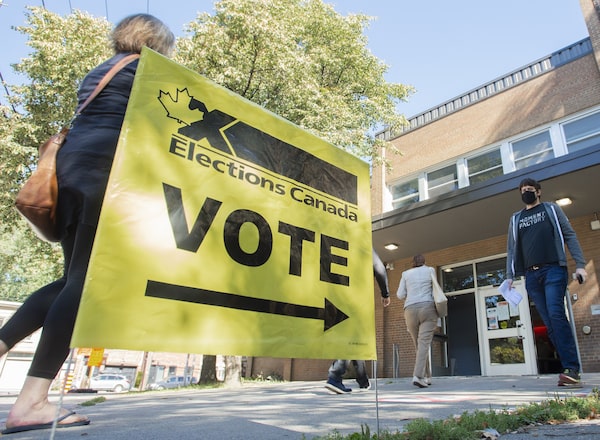
People arrive to cast their ballot on federal election day in Montreal, on Sept. 20, 2021. A Parliamentary committee is set to decide whether or not it will expand its current study on foreign election interference to include more details about the 2021 federal election.Graham Hughes/The Canadian Press
We now know the Canadian Security Intelligence Service found there was an organized Chinese-government effort to interfere in Canada’s election in 2021. What we don’t know is whether anything has been done with that information.
It’s not a question of exposing CSIS’s spy-versus-spy world of clandestine surveillance and neutralizing threats with shadowy techniques.
What we need to know is what, if anything, emerged into the more solid world of policing elections. We need to know if Canada actually did anything about it. That’s what the House of Commons’ procedure committee has to investigate.
On Tuesday, the committee passed a motion to expand a study of foreign interference in elections, but an NDP-backed Liberal amendment was passed to quash a Conservative call for documents.
Now there’s a question about whether this committee will get to the bottom of the things Canadians need to know: whether CSIS’s information led to anything.
CSIS concluded that Beijing wanted to see Prime Minister Justin Trudeau’s Liberal government be re-elected, but only with a minority – although The Globe and Mail reported that CSIS director David Vigneault told Mr. Trudeau that there was no indication Chinese influence elected any MP.
But the foreign interference wasn’t just comments, tweets or propaganda. There were breaches of the elections laws, including illegal cash contributions to candidates, having businesses hire international students who were assigned to full-time volunteering for a candidate, and illegally returning a portion of a donation so the donor was not out of pocket after claiming a tax credit.
Once those things were discovered, what happened next?
Mr. Trudeau has downplayed the whole business by arguing that it wasn’t a secret that China’s government was interfering in elections, and that in the end, Canadians decided the outcome by casting ballots.
Both of those things are true. It was known that Beijing was actively seeking to interfere, and there is no sign that foreign actors rigged actual balloting, so yes, it was Canadians who voted.
But that is not nearly enough.
There is a reason why we have election laws that set donation and spending limits, rules about advertising, and requirements that nearly all of those things be left to citizens. Those rules are supposed to protect our elections from undue influence and manipulation – especially by foreign governments.
Let’s recall that in 2019, Mr. Trudeau set up a panel of senior civil servants tasked with monitoring election campaigns for “critical incidents” such as substantial foreign interference. That panel was mandated with a formal protocol, which provided that “barring any overriding national security/public security reasons,” the security agencies should inform the “affected party.” It listed examples of who those affected parties might be: a candidate, a political party, Elections Canada.
But the Conservatives said it was never told of the Chinese interference. The party’s defeated MP, Kenny Chiu, who was reportedly targeted by Beijing, has said he wasn’t told.
Elections Canada, through spokesperson Matthew McKenna, said they were not told, but added they wouldn’t be unless it was about something affecting the overall organization of an election. If it was about breaches of elections law, then it would be a matter for Commissioner of Canada Elections Caroline Simard. Ms. Simard’s office noted they are not allowed to reveal who, if anyone, brought forward an allegation.
But Canadians need to know if anything happened. Of course, CSIS won’t want to reveal too much about spying on Chinese diplomats. It’s possible the spy agency didn’t reveal anything to police or the Elections Commissioner. But we should know if Canada has eyes to see election interference but no arm of the law to act on it.
Canada could have expelled Chinese diplomats. But expulsion isn’t much of a punishment for the Chinese government, which would respond in kind and send a replacement.
There would be a stronger deterrence message from prosecuting donors who broke the law in cahoots with Chinese government officials, or executives of companies that hired fake employees to volunteer on campaigns, or campaign workers who illegally returned parts of donations.
Why aren’t those things happening? MPs need to know. They might need to change the laws so such things can be prosecuted in sterner ways. Or prosecuted at all.
The key question about foreign interference is now this: Once Canadian authorities know about it, do they do anything about it?
 Campbell Clark
Campbell Clark